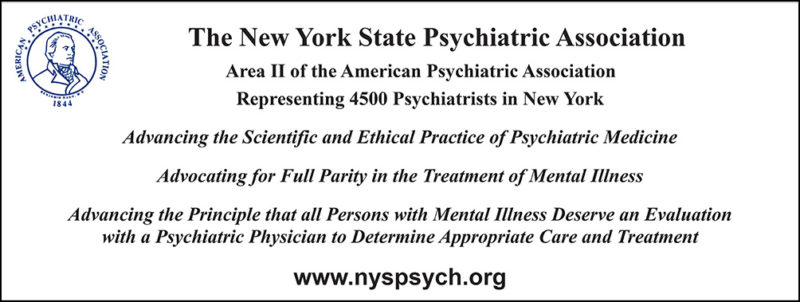New York State has unfortunately become an epicenter of the COVID-19 public health emergency, with more confirmed positive cases than any other State in the nation. During the COVID-19 crisis, the use of telehealth and telemedicine has become an essential tool in ensuring continued access to mental health care and treatment for impacted individuals. Both the federal government and the State of New York have taken significant efforts to ensure that individuals in need continue to receive essential health care and treatment through telehealth when in-person visits cannot take place. On March 12, 2020, New York Governor Andrew Cuomo issued Executive Order No. 202.1 relaxing state requirements for the provision of telehealth in connection with the State disaster emergency, as follows:

Rachel A. Fernbach, Esq.
Section 2999-cc of the Public Health Law and any regulatory provisions promulgated thereunder by the Department of Health, the Office of Mental Health, the Office of Addiction Services and Supports, and the Office for People with Developmental Disabilities, to the extent necessary to allow additional telehealth provider categories and modalities, to permit other types of practitioners to deliver services within their scopes of practice and to authorize the use of certain technologies for the delivery of health care services to established patients, pursuant to such limitations as the commissioners of such agencies may determine appropriate.
The next day, on March 13, 2020, President Donald Trump declared a national emergency and confirmed that United States Health and Human Services Secretary Alex Azar had been granted the authority to waive existing laws to enable the provision of telehealth services across the country. In subsequent days, the federal Centers for Medicare and Medicaid Services (CMS) and the New York Department of Health confirmed flexibility in the use of telehealth services to address challenges created by the public health emergency. Among other changes, this temporary flexibility allowed for the provision of telehealth in the private home of a Medicare or Medicaid beneficiary, not previously permitted under federal rules.
Coverage for Telemedicine
In general, telehealth and telemedicine services are billed using the same CPT® codes customarily used for all other in-person services. For example, a 45-minute psychotherapy session in an office setting may be billed using an evaluation and management code (often, 99212 or 99213) and an add-on psychotherapy code (90836). A 45-minute psychotherapy session provided via telemedicine is billed using the very same CPT® codes. In addition, CMS recently clarified that providers should continue to use Place of Service Code 11 (Office), along with a modifier, usually 95 or GT, depending on the carrier, to indicate the provision of telemedicine to a patient in his or her own residence. These billing instructions apply generally in the context of Medicare, Medicaid, commercial carriers and private pay patients. For Medicaid managed care plans or commercial plans, please contact the carrier to confirm any specific billing requirements in place.
New York Statute Telehealth Delivery of Services
Several years ago, New York State enacted legislation requiring health insurers to provide coverage and reimbursement for services provided via telehealth where the service is otherwise covered under a health insurance policy. However, the New York statute applies only to plans that are subject to insurance mandates under state law – typically, an individual or group health plan purchased by means of monthly insurance premiums. Pursuant to federal ERISA law, large multi-state employers, union health plans and self-insured businesses are not subject to the requirements of state law. Therefore, a self-insured plan or union health plan is not mandated to provide coverage for telehealth under New York law. In order to determine whether a plan is subject to the New York telehealth statute, the provider or patient must make efforts to determine the type and nature of the patient’s plan and whether it is ERISA-exempt or subject to the requirements of state law – including the state telehealth statute.
HIPAA
The U.S. Department for Health and Human Services (HHS) Office for Civil Rights has indicated that, during the public health emergency, it will exercise enforcement discretion and will not impose penalties for the good faith use of telehealth communication services that are non-HIPAA compliant. This special accommodation will permit providers to use certain non-public facing remote communications products, such as FaceTime, Zoom, or Skype, in order to enhance access to services during the crisis. These more permissive rules apply to telehealth services provided for any reason, “regardless of whether the telehealth service is related to the diagnosis and treatment of health conditions related to COVID-19.” Please keep in mind that the current enforcement discretion applies only to HIPAA security requirements in connection with the use of telehealth services and does not impact other HIPAA privacy and confidentiality requirements currently in place.
Prior Relationship Requirement
Certain federal rules regarding telemedicine require that a patient have a prior established relationship with the practitioner in order to participate in telemedicine. CMS has indicated that it will not conduct audits to ensure that such a prior relationship existed for claims submitted during this public health emergency.
Virtual Check-In Services
In the event a patient is unable or declines to participate in telemedicine, another potential option is a Virtual Check-In, which has been made available by CMS and is approved for payment when provided to Medicare beneficiaries. Using this service, Medicare patients located in their homes may have a brief communication with their provider using telephone or other means of audio/video communication. A Virtual Check-In does not require the same audio and visual capabilities for real-time communication that are required for telemedicine.
CMS has clarified that a patient must verbally consent to receive Virtual Check-In services. In most cases, this service will be initiated by the patient, but providers may need to educate beneficiaries on the availability of the service prior to patient initiation. The following CPT code may be used in connection with Virtual Check-In services for Medicare beneficiaries:
HCPCS code G2012: Brief communication technology-based service, e.g. virtual check-in, by a physician or other qualified health care professional who can report evaluation and management services, provided to an established patient, not originating from a related e/m service provided within the previous 7 days nor leading to an e/m service or procedure within the next 24 hours or soonest available appointment; 5-10 minutes of medical discussion.
Electronic Prescribing of Controlled Substances via Telemedicine
The federal Ryan Haight Act requires a provider to conduct an initial, in-person examination of a patient before prescribing a controlled substance electronically. Effective March 17, 2020, the U.S. Drug Enforcement Administration has announced that this requirement has been suspended for the duration of the public health emergency.
OMH Emotional Support Helpline (1-844-863-9314)
In March of this year, Governor Cuomo announced the creation of a state-wide hotline to provide free mental health services to individuals at home who may be experiencing stress and anxiety due to the COVID-19 crisis. The New York State Office of Mental Health Emotional Support Helpline “provides free and confidential support, helping callers experiencing increased anxiety due to the coronavirus emergency. The Help Line is staffed by volunteers, including mental health professionals, who have received training in crisis counseling.” In order to staff the Helpline, the Governor called upon mental health professionals to volunteer to provide telephone and/or telehealth counseling for individuals in need. To volunteer, professionals are asked to complete a survey at health.ny.gov/assistance and click on the tab for health, mental health and related professionals. Mental health providers interested in volunteering should indicate on the form that they are available for telephone and telehealth counseling services.
One concern among professionals interested in volunteering may be whether participation in volunteer psychiatric and mental health counseling services will subject psychiatrists or other professionals to potential malpractice liability. Executive Order 202.10, signed by Governor Cuomo on March 7, 2020, expands New York’s Good Samaritan law to ensure immunity from civil liability for any injury or death arising out of medical services provided in support of the State’s response to the COVID-19 outbreak. This protection from liability extends to volunteer mental health counseling services provided during the current public health crisis, unless such injury or death is caused by gross negligence. Further, some psychiatry malpractice insurance carriers have confirmed that their policies will cover psychiatric services provided on a volunteer basis in the state where a psychiatrist is licensed to practice medicine. For additional information, professionals should contact their individual carriers.
Telemedicine and other telehealth services are a key component in ensuring continuity of care for individuals with mental illness during the ongoing COVID-19 crisis. In addition, the OMH Helpline uses remote access to assist those experiencing increased anxiety, stress and fear. The use of remote technology plays a vital role in our efforts to address the mental health needs and emotional well-being of all individuals impacted by this crisis.
Rachel Fernbach is the Deputy Director and Assistant General Counsel of the New York State Psychiatric Association, a division of the American Psychiatric Association and the medical specialty society of psychiatrists practicing in New York State. Ms. Fernbach is also a Partner at Moritt Hock & Hamroff LLP where she concentrates her practice in not-for-profit and mental health law.
© New York State Psychiatric Association, Inc., April 2020







